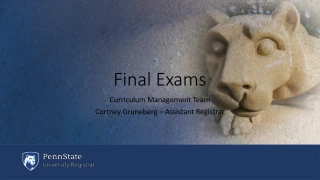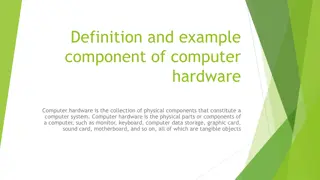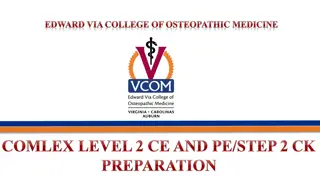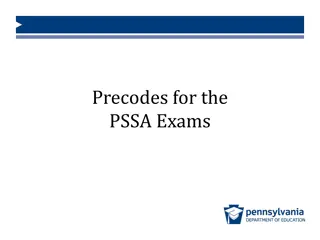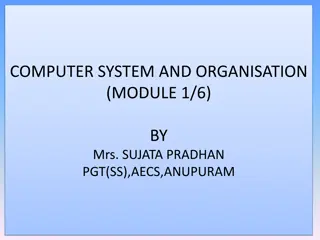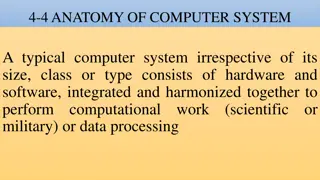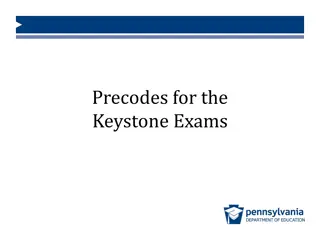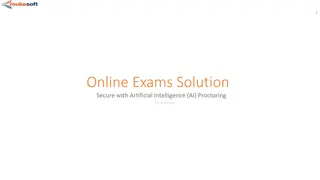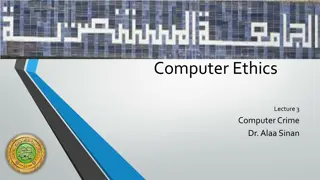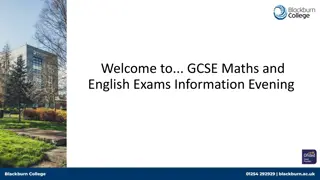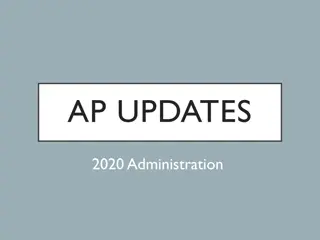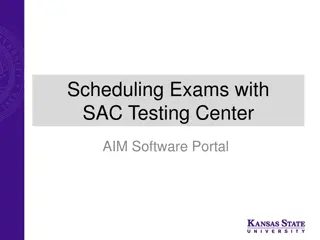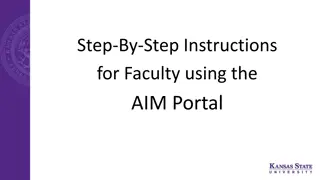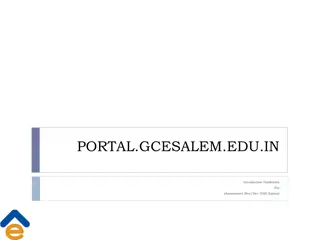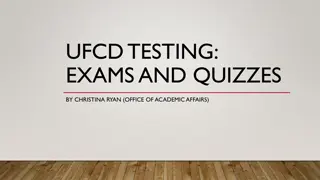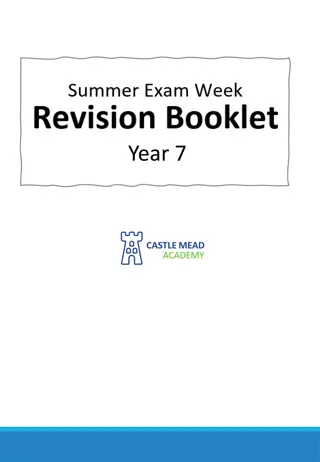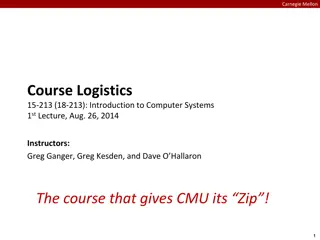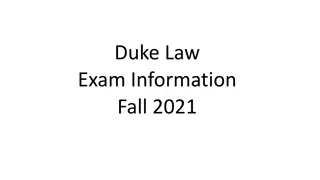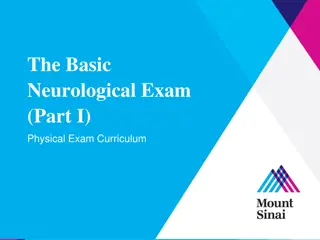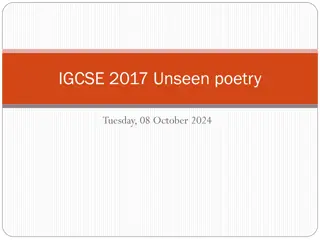Final Exams: Scheduling, Procedures & Policies
Final exams fulfill academic objectives through various means. Learn how to schedule, types of finals, deadlines, and more. Plan your exams effectively.
1 views • 23 slides
How to prepare for CBSE Class 12 Board Exams 2024 for best results?
Preparing for the CBSE Class 12 Board Exams in 2024 requires a strategic and focused approach to ensure optimal results. As the culmination of secondary education, these exams play a crucial role in shaping academic and professional futures. To achieve the best results, students must adopt a compreh
1 views • 2 slides
Understanding Computer Organization and Architecture
A computer system is a programmable digital electronics device that processes data as per program instructions to provide meaningful output. It comprises hardware and software components, with hardware being the physical parts and software essential for driving the hardware. Computer organization fo
14 views • 71 slides
Strategies for Success in Mathematics GCSE Exams
Tips and resources to excel in Mathematics GCSE exams, including exam paper structure, tier differences, key topics like quadratic equations and trigonometry, flashcards, exercise books, online resources like Dr. Frost and Corbett Maths, and advice on maximizing learning and preparing for mock exams
0 views • 8 slides
Information About 2023 Exams for ST.Vg3 Students and Guardians
Important details regarding the 2023 exams for ST.Vg3 students and their guardians. Includes exam dates, subjects, preparation information, exam procedures, and guidelines for both written and oral exams. Details about digital and practical exams, exam schedule, permitted materials, and procedures f
2 views • 16 slides
Overview of Computer Hardware Components and Software Functions
Computer hardware components such as monitor, CPU, mouse, and projector are essential physical parts of a computer system, while software includes intangible programs like operating systems and utility software. Hardware components perform tasks like displaying data, processing information, and prin
8 views • 9 slides
Medical Licensing Exams Overview
Overview of medical licensing exams including COMLEX Level 2, USMLE Step 2, student preferences for taking the exams, reasons for D.O. students to take USMLE Step 2 CK, and board preparation methods used by students.
0 views • 36 slides
PSSA Exams Precodes Overview and Data Flow
The provided content discusses the process of precoding for PSSA exams, including agenda, timeline, data submission to PIMS, internal snapshot details, and data flow through Pennsylvania Information Management System (PIMS). It emphasizes the importance of ensuring data accuracy and meeting submissi
0 views • 30 slides
English for Competitive Examinations Course Details
This course aims to prepare students for competitive exams such as UPSC, Defense, SSC, Banking, KPSC, Insurance, and more by focusing on areas commonly discussed in these exams. It helps students improve their English skills through word-based, sentence-based, and passage-based questions to enhance
0 views • 6 slides
Understanding Computer Architecture and Organization
Computer architecture and organization are fundamental aspects of computing systems. Computer architecture focuses on the functional design and implementation of various computer parts, while computer organization deals with how operational attributes come together to realize the architectural speci
3 views • 40 slides
Understanding Computer System and Organization
Computer Organization involves the logical structure of a computer, defining the interconnections of components for optimal performance. Computers process data through an Input-Process-Output cycle, with input, processing, and output units working together. The characteristics of a computer include
1 views • 20 slides
Computer Science Department Information and Courses Offered
The Computer Science Department provides information on courses offered for GCSE or BTEC qualifications, specifically focusing on the AQA GCSE in Computer Science. The course equips students with valuable thinking and programming skills essential in the modern workplace, covering key concepts and pr
3 views • 7 slides
Anatomy of a Computer System: Hardware Components and Functions
A typical computer system consists of hardware and software working together to perform various computational tasks. The hardware components include the central processing unit (CPU), input/output devices, storage units, and the motherboard. The CPU acts as the main brain of the computer, performing
6 views • 6 slides
Dominica 2021 CCSLC Results Analysis
The Ministry of Education in Dominica has released the CCSLC results for 2021, showing 672 school candidates with a notable increase in the number of students compared to the previous year. The exams were conducted online for the first time, with schools attempting exams in various subject areas. Ke
2 views • 33 slides
International Baccalaureate (IB) Assessment and Examination Overview
International Baccalaureate (IB) assessments and exams process for grades 9 to 12 outlined in detail. It covers exam schedules, assessments, grade predictions, and final result procedures. Grade 9 and 10 students take Ontario exams, while Grade 11 and 12 IB students write IB exams and submit interna
0 views • 21 slides
**Exploring Inquiry-Based Learning in Computer Science Education**
Inquiry-based learning (IBL) in computer science classrooms focuses on fostering communication, collaboration, decision-making, and problem-solving skills among students. The approach involves students constructing knowledge through independent, active activities based on real-world experiences. How
0 views • 18 slides
Evolution of Algorithms and Computer Science Through History
The history of algorithms and algorithmic thinking dates back to ancient times, with the development of general-purpose computational machines by Charles Babbage in the 19th century marking a significant advancement. The term "computer science" emerged in 1959, encompassing theoretical computer scie
1 views • 39 slides
Cambridge Checkpoint Exams: Information and Guidelines for Parents and Students
Detailed information about the Cambridge Checkpoint exams including exam structure, subjects, grading system, exam dates, fees, and resources for revision. Parents and students can find useful insights and guidelines to prepare for the exams effectively.
0 views • 8 slides
Keystone Exams Precodes Process Overview
Keystone Exams Precodes involve data submission to the Pennsylvania Information Management System (PIMS), identifying students who must take the exams, setting up test sessions, and ensuring data quality for successful submission to PIMS. The process includes timelines, internal snapshot deadlines,
1 views • 31 slides
Enhancing Online Exams Security with AI Proctoring Solutions
Revolutionize your online examination process with AI-powered proctoring solutions ensuring secure and efficient monitoring of exams. Benefit from features like live monitoring, suspect video detection, and AI-generated reports, leading to wider reach, cost savings, and enhanced security. Simple ste
0 views • 17 slides
Understanding Computer Crimes and Prevention Strategies
Computer crimes involve illegal acts utilizing computer systems, leading to various consequences. This lecture covers the types of computer system attacks, motives behind computer crimes, costs, prevention strategies, and reflection on the discussed topics. It emphasizes the increasing scope of comp
1 views • 20 slides
GCSE Maths and English Exams Information Evening
Get ready for your GCSE Maths and English exams with important information on exam dates, awarding bodies, additional support, exam durations, equipment requirements, and exam day procedures. Ensure you are well-prepared and know what to expect on the exam days to perform your best. Don't forget to
0 views • 14 slides
Mastering English Exams with Jennifer Webb: Tips and Strategies for Success
Prepare effectively for English Language and Literature exams with expert advice from Jennifer Webb. Learn to approach exams as strategic challenges, not just writing tasks. Follow tips on planning your writing, analyzing extracts in literature papers, and incorporating context effectively in your r
0 views • 7 slides
Important Updates for AP Exams 2020 Administration
Receive your e-ticket two days before each test for online AP exams. Check-in on exam day using your unique e-ticket. Make sure to test in May to have June dates as backup. Conflicts in May will automatically schedule you for June makeup dates. Students taking certain courses have portfolio submissi
0 views • 52 slides
Thermal Physics Lecture by Dr. Erwin Sitompul at President University
Dr. Erwin Sitompul delivers Thermal Physics Lecture at President University covering topics like First Law of Thermodynamics, Kinetic Theory, and Second Law of Thermodynamics. The course includes a Grade Policy involving notes, homework, quizzes, and exams, with additional points for problem-solving
0 views • 28 slides
Alternative Testing Instructions for Students using AIM System
Students using the Accessible Information Management (AIM) online system for scheduling quizzes and exams are guided on how to request accommodations, communicate with instructors, schedule exams, and manage exam requests. Instructions include accessing AIM, submitting exam forms, scheduling exams,
0 views • 7 slides
Scheduling Exams with SAC Testing Center - AIM Software Portal Overview
Learn how to effectively schedule exams with the Student Access Center (SAC) Testing Center using the AIM Software Portal. Follow the step-by-step guide to ensure you successfully request accommodations, schedule exams, and comply with necessary timelines. Gain insights on important considerations a
0 views • 9 slides
Step-By-Step Instructions for Faculty Using the AIM Portal
General overview of the process for faculty members using the Accessible Information Management (AIM) portal at their Student Access Center (SAC). Key points include applying and registering with SAC, requesting letters of accommodation, scheduling exams, completing Alternative Testing Agreements, a
0 views • 13 slides
Understanding the Law School Exam Process
Explore the detailed process of law school exams, including scheduling, anonymity, timed proctored exams, resources, and key dates for the Fall 2020 Final Exam Period. Learn about the requirements for taking exams, accommodations, and the importance of following guidelines set by the Office of Stude
0 views • 34 slides
Guidelines for eAssessment in Nov/Dec 2020 Exams at PORTAL.GCESALEM.EDU.IN
Ensure a smooth experience during the upcoming eAssessment exams by following the mandatory guidelines outlined by PORTAL.GCESALEM.EDU.IN. Students must have a stable internet connection, use supported browsers, and follow specific instructions for writing and submitting their exams. Familiarize you
0 views • 6 slides
Guidelines for Taking Closed-Book Exams at Alabama Law School
General rules and procedures for taking closed-book exams at Alabama Law School are outlined in the student handbook. It is crucial to follow exam protocols, arrive on time, and complete the exam in the assigned location as per the Honor Code. Examplify software must be installed for exam access, an
0 views • 10 slides
Essential Information on Testing, Exams, and Quizzes at UFCD
Navigate the testing process at UFCD with details on exams, quizzes, Respondus Lockdown Browser, Canvas quizzes, types of Canvas questions, and accessing Canvas exams. Learn about honor code, ExamSoft, Examplify, and more from the Office of Academic Affairs and Student Affairs.
0 views • 12 slides
Preparing for Year 7 End-of-Year Exams: Strategies for Success
Get ready for your Year 7 end-of-year exams with guidance on creating revision timetables, tips for managing stress, and specific strategies for revising English. Remember to bring your English books and stay on top of your revision schedule to excel in your exams.
0 views • 48 slides
Effective Strategies for Using Readers and Writers in Exams
Learn how readers and writers can assist you during exams by decoding text, reading instructions, and more. Discover what they can and cannot do, as well as useful phrases to communicate effectively with them. Explore the benefits of having a scribe for expressing thoughts quickly and effortlessly i
0 views • 10 slides
Carnegie Mellon Course Logistics: Introduction to Computer Systems
Carnegie Mellon University offers the course 15-213: Introduction to Computer Systems, taught by instructors Greg Ganger, Greg Kesden, and Dave O. Hallaron. The course covers essential topics in computer systems and programming, emphasizing practical skills through lectures, labs, and exams. Recomme
0 views • 23 slides
Important Information for Duke Law Exams - Fall 2021
This semester at Duke Law, exams will be conducted as either in-class or take-home exams. Detailed instructions and guidelines are provided for exam format, materials allowed, and exam room regulations. Remember to follow all instructions carefully and ensure compliance with exam protocols to uphold
0 views • 20 slides
Comprehensive Guide to Neurological Exams
This guide provides a detailed overview of neurological exams, focusing on components such as cognition, motor function, and cranial nerves. It covers essential aspects like mental status, reflexes, sensation, and gait assessment. The importance of thorough examination in primary care settings is em
0 views • 29 slides
Essential Guide for Analyzing Unseen Poetry in Exams
Effective strategies for approaching unseen poetry questions in exams include understanding the format, identifying voice and situation, analyzing language choices and imagery, looking for anomalies, and trusting your intuition to craft a personal response. This guide emphasizes the importance of cl
0 views • 15 slides
Excel in Exams with the Best Preparation in Delhi
Preparation in Delhi, the educational hub of India, offers unmatched resources and expert coaching to help students ace their exams. Whether preparing for competitive exams like GRE, GMAT, SAT, or language proficiency tests like IELTS and TOEFL, Delh
2 views • 9 slides
Effective Strategies for Succeeding in HSC Exams
Learn essential tips for excelling in HSC exams, including exam preparation, timing, equipment requirements, and what to do in case of issues like illness or lateness. Understand how exams are set and marked, and master multiple-choice question techniques for optimal performance.
0 views • 20 slides
